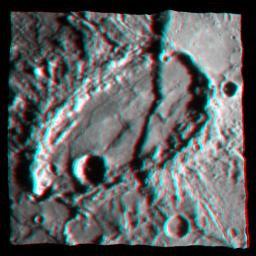
|
Mercury - in 3-D!
- Click the image above for a larger view
- Full-Res JPEG (600 x 600) (60.7 kB)
- Full-Res TIFF (600 x 600) (1.1 MB)
Caption:
This graphic shows a portion of the fault scarp Beagle Rupes (see PIA10939 ) cutting through the highly elliptical crater Sveinsdóttir in a three-dimensional (3D) representation. By combining information from multiple images of the same portion of Mercury's surface taken under different viewing angles, the topography of the surface was determined. A high-resolution image was then overlaid on the topography map, resulting in this 3D image. In total, over 80 MESSENGER images were used to create this 3D view of Mercury's surface. As the MESSENGER mission continues, many more images will be acquired, and these additional images will provide views of Mercury's surface from a variety of illumination conditions and viewing geometries. These myriad views, anchored by topographic profiles to be acquired by MESSENGER's laser altimeter, will enable large portions of the surface of Mercury to be studied in 3D.
Date Acquired
: January 14, 2008
Image Mission Elapsed Time (MET)
: NAC image from 108830230 resampled on a topographic map made from more than 80 NAC and WAC images.
Instrument
: Narrow Angle Camera (NAC) and Wide Angle Camera (WAC) of the Mercury Dual Imaging System (MDIS)
Scale
: Sveinsdóttir crater is about 120 kilometers by 220 kilometers (75 miles by 140 miles).
Background Info:
These images are from MESSENGER, a NASA Discovery mission to conduct the first orbital study of the innermost planet, Mercury. For information regarding the use of images, see the MESSENGER image use policy .
Cataloging Keywords:
| Name | Value | Additional Values |
|---|---|---|
| Target | Mercury | |
| System | ||
| Target Type | Planet | |
| Mission | MESSENGER | |
| Instrument Host | MESSENGER | |
| Host Type | Orbiter | |
| Instrument | Mercury Dual Imaging System (MDIS) | |
| Detector | Narrow Angle Camera (NAC), Wide Angle Camera (WAC) | |
| Extra Keywords | Color, Crater, Map | |
| Acquisition Date | ||
| Release Date | 2008-09-09 | |
| Date in Caption | 2008-01-14 | |
| Image Credit | NASA/Johns Hopkins University Applied Physics Laboratory/Carnegie Institution of Washington/Planetary Science Institute | |
| Source | photojournal.jpl.nasa.gov/catalog/PIA11078 | |
| Identifier | PIA11078 | |
